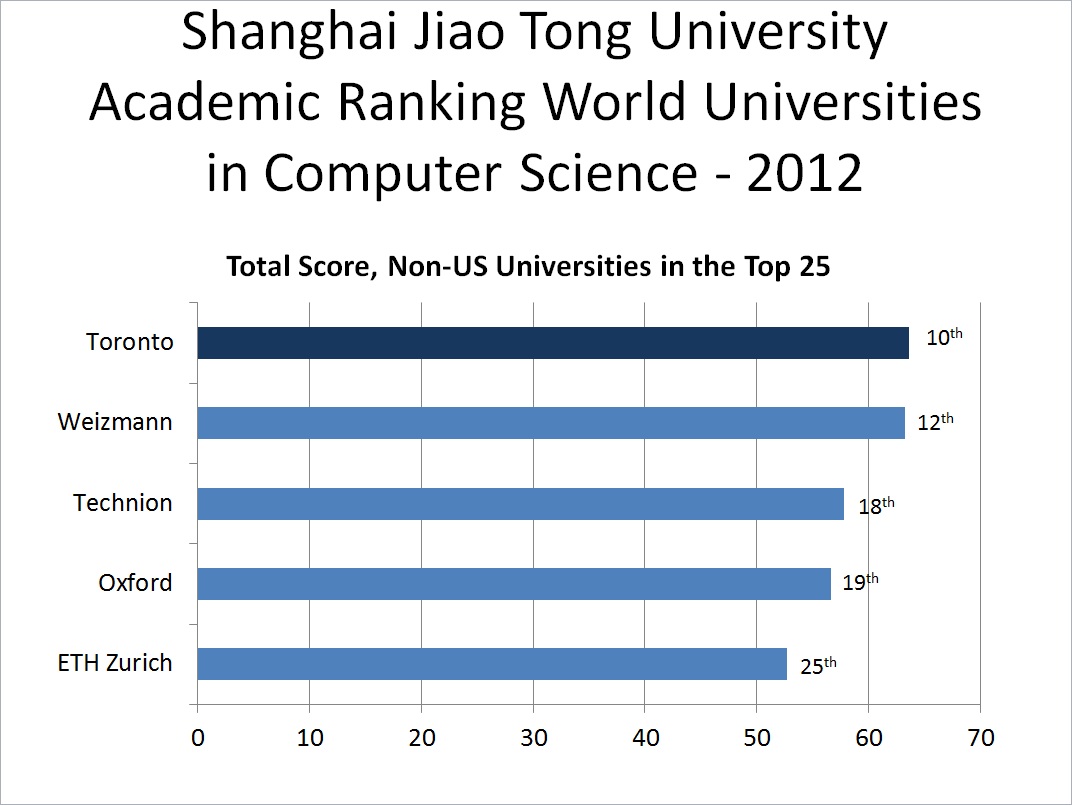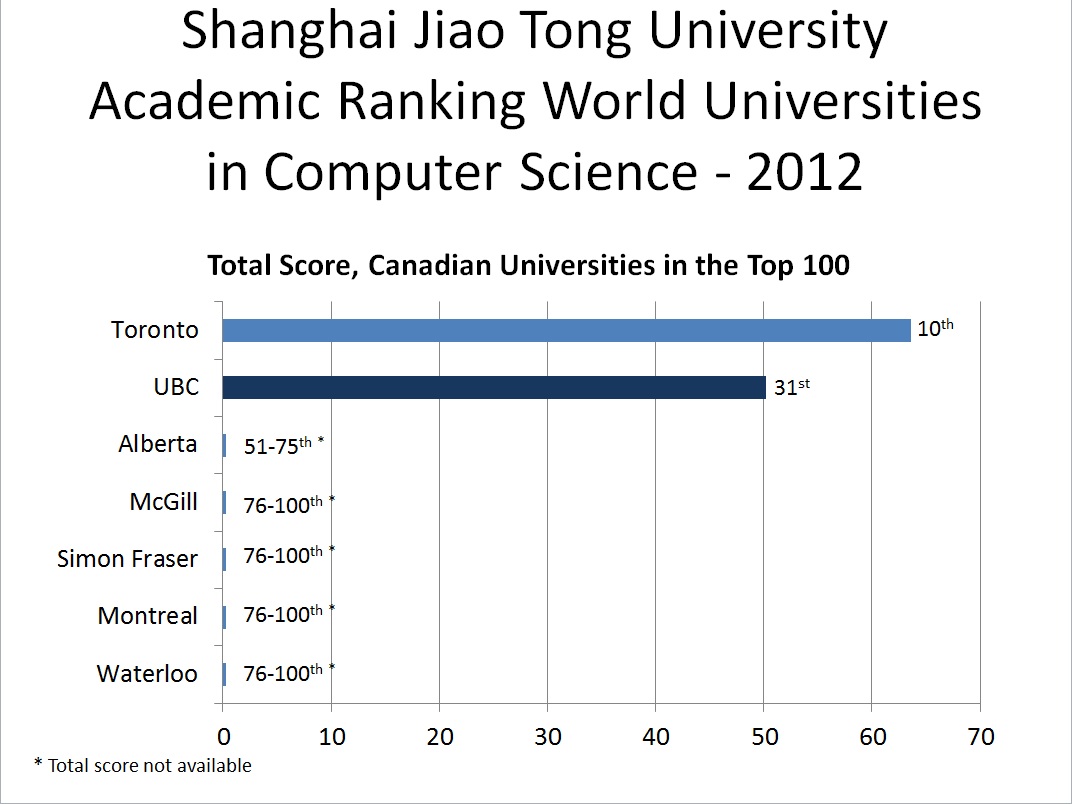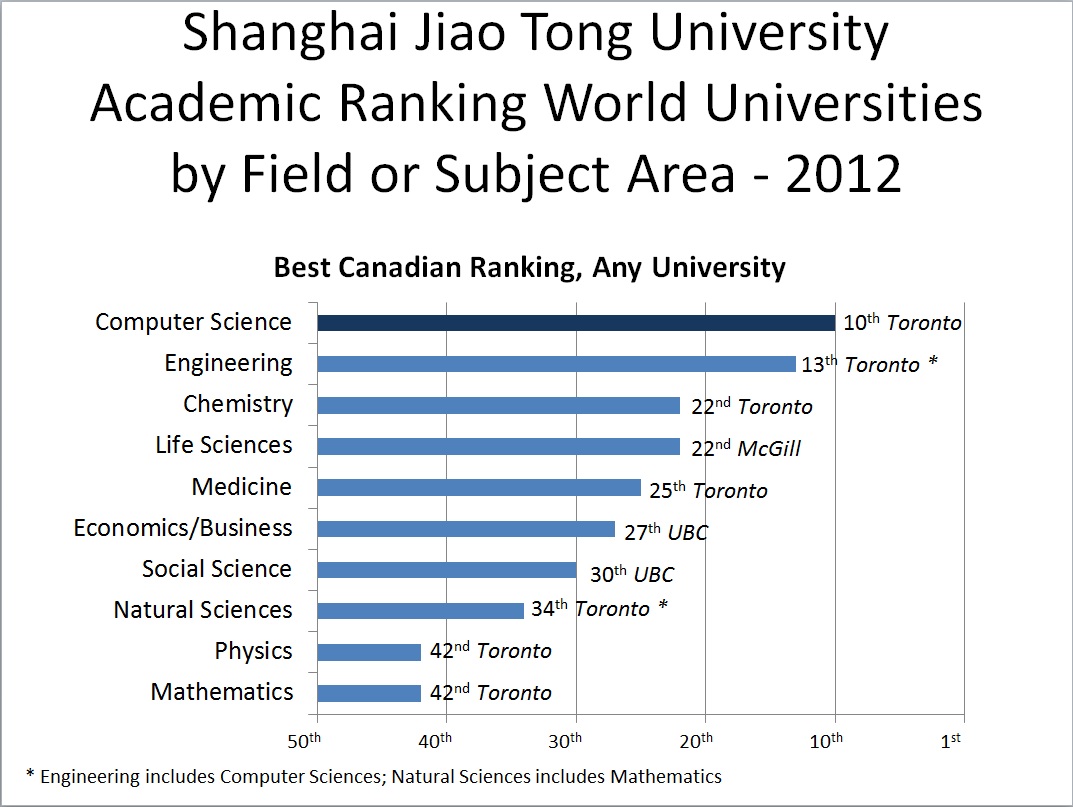
Thu 29 Nov 2012 00:00
A closer look at the University of Toronto's international ranking in Computer Science.
International rankings of universities seem to be all the rage these days. The interest seems to be fed by three rankings of particular prominence that have emerged in the past decade. These are Shanghai Jiao Tong University's Academic Ranking of World Universities (sometimes known as AWRU, or simply as the "Shanghai Ranking"), Quacquarelli Symonds' QS World University Rankings, and the Times Higher Education World University Rankings. Part of the attractiveness of these rankings is that they can become a way of "keeping score", of seeing how one institution does in comparison to others.
My employer, the University of Toronto, does quite well in these rankings, particularly my department, Computer Science. The subject area of Computer Science is not ranked separately in the Times Higher Education World University Rankings (it's bundled together with Engineering), but in the other two, Toronto has consistently ranked in the top ten in the world each year in Computer Science, with only one exception.
This exception is recent, however, and worth a closer look. In the QS World University Rankings for Computer Science and Information Systems, Toronto dropped from 10th in 2011 to 15th in 2012. This big drop immediately raises all sorts of questions: has the quality of Toronto's Computer Science programme suddenly plummetted? Has the quality of Computer Science programmes at other universities suddenly soared? Or has the QS World University Rankings changed its methodology?
To answer this question, let's look at how other universities have changed from 2011 to 2012 on this ranking. Many (MIT, Stanford, Berkeley, Harvard, Oxford, Cornell, and others) stayed where they were. Others dropped precipitously: Cambridge University dropped from 3rd to 7th, UCLA from 8th to 12th, and Caltech plummetted from 7th to 27th. Some other universities went up: Carnegie Mellon University (CMU) went from 9th to 3rd, ETH Zurich from 11th to 8th, the National University of Singapore (NUS) from 12th to 9th, and the Hong Kong University of Science and Technology (HKUST) soared from 26th to 13th. Surely these curious and significant changes reflect a methodology change? But what?
The QS university rankings website, in the Methodology section, Academic subsection, reveals something of interest:
NEW FOR 2012 - Direct Subject Responses Until 2010, the survey could only infer specific opinion on subject strength by aggregating the broad faculty area opinions of academics from a specific discipline. From the 2011 survey additional questions have been asked to gather specific opinion in the respondent's own narrow field of expertise. These responses are given a greater emphasis from 2012.To understand this change, it needs to be recognized that the QS rankings rely highly on the opinions of academics. A large number of academics around the world are surveyed: the QS rankings website indicates that in 2012, 46079 academic responses were received, of which 7.5% addressed Computer Science." The seemingly modest change made in 2012, to weigh more heavily the opinions of academics in a field about their own field, given its impact on the 2012 results for Computer Science, leads one to wonder about the regional distribution of academics in Computer Science in comparison to academics in other disciplines. One significant factor may be China.
In 1999, courses in the fundamentals of computer science became required in most Chinese universities, and by the end of 2007, China had nearly a million undergraduates studying Computer Science. While QS rankings does not indicate regional distribution by discipline for the academics whose opinions it consults, the surge in the number of Chinese computer scientists worldwide in the past decade almost certainly must have an effect on the regional distribution of academics in Computer Science as compared to other disciplines. As such, is it any surprise to see world universities prominent in China that possess strong Computer Science programmes (such as HKUST and NUS) climb significantly in the rankings, and others less prominent in China plummet? But if a world ranking of universities is so affected by regional shifts in those whose opinion is being solicited, how reliable is it as an objective gage of the real quality of a given university?
Perhaps a more reliable gage of quality can be found in the Shanghai ranking, which is not opinion-based, but relies on concrete indicators and metrics. On the Shanghai ranking, the University of Toronto consistently ranks 10th in the world in Computer Science in 2010, 2011, and 2012. But what does this mean, concretely?
To answer these questions, we need to grapple with an important fact: in Computer Science, the US dominates. As a nation, the US has been enormously supportive of Computer Science ever since the field first existed, and as a result, it has become pre-eminent in computing. Nine of the top ten schools in the Shanghai ranking, and twenty of the top twenty-five, are in the US. For the University of Toronto to be one of the handful of universities outside the US to break into the top twenty-five, and the only one to break into the top ten, is a significant accomplishment. A chart is illustrative:

Of course, the University of Toronto is in Canada, so a comparison to other schools in Canada is also illustrative. For Computer Science, on the Shanghai ranking, there seems to be no close Canadian rival. In 2012, UBC comes closest, being a only a few points short of breaking into the top 25, but all other Canadian schools rank well back:

Even compared to other disciplines that have Shanghai rankings (only science, social science, and related disciplines seem to be ranked), Toronto's pre-eminence in Computer Science in Canada is striking:

From a score-keeping perspective, I think we can conclude that the University of Toronto is doing very well in Computer Science with respect to other universities in Canada, and it is one of the few non-US schools that can keep up with the US in this field.
But all this needs to be put into perspective. After all, rankings are not a full picture, they're aggregations of metrics of varying value, they represent a formulaic approach to something (university education) that cannot always be so conveniently summarized, and they reflect methodologies chosen by the producers of the rankings, methodologies that may not always best reflect objective quality. Of course, if the University of Toronto were to climb to fifth, I'd be pleased, and if it were to drop to fifteenth, I'd be disappointed: surely the score-keeper in me can be allowed this much. But in the overall scheme of things, what matters most for Computer Science at Toronto is not our score on a ranking system, but the objective quality of our programme, the learning outcomes of our students, and the impact of our research, and these things, not our score on rankings, must always remain our top priorities.
